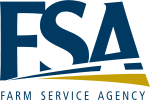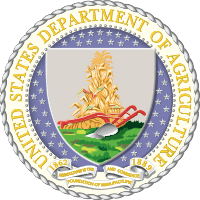Farm Service Agency

The Farm Service Agency (FSA) is the United States Department of Agriculture agency into which were merged several predecessor agencies, including the Agricultural Stabilization and Conservation Service (ASCS). The ASCS was, as the FSA is now, primarily tasked with the implementation of farm conservation and regulation laws around the country. The Administrator of FSA reports to the Under Secretary of Agriculture for Farm and Foreign Agricultural Services. The current administrator is Val Dolcini, appointed in 2014. The FSA (ASCS) of each state is led by a politically appointed State Executive Director (SED).
FSA was set up when the department was reorganized in 1994,[1] incorporating programs from several agencies, including the Agricultural Stabilization and Conservation Service, the Federal Crop Insurance Corporation (now a separate Risk Management Agency), and the Farmers Home Administration. Although its name has changed over the years, the agency's relationship with farmers goes back to the 1930s. Earlier USDA agencies that evolved into FSA include the Agricultural Adjustment Administration, War Food Administration, Production and Marketing Administration, and Commodity Stabilization Service, as well as ASCS.[2]
In the 1930s, Congress set up a unique system under which federal farm programs are administered locally; this was influenced by the powerful Southern block in Congress, who represented only white Democrats from their home districts. White control of this program in counties across the South deprived many black farmers of potential benefits, as blacks had been politically disenfranchised at the turn of the century.
Farmers who are eligible to participate in these programs elect a three- to five-person county committee, which reviews county office operations and makes decisions on how to apply the programs. County committees are panels of three to five farmers, elected by other farmers, to oversee the local operation of commodity programs, credit, and other programs of the Farm Service Agency. County committees, established by the Soil Conservation and Domestic Allotment Act of 1935 (P.L. 74-46), are so named because they have overseen USDA field offices for farmers that once existed in most rural farm counties throughout the United States.
In the South, black farmers were long excluded from such county boards, and were discriminated there and in other parts of the county in administration of these programs. A class action lawsuit, Pigford v. Glickman, was settled in 1999 to gain compensation for African-American farmers who had been damaged by such discrimination from 1981 to 1996. USDA's own investigation had shown widespread discrimination in the programs. The USDA paid more than $2 billion to settle thousands of claims of discrimination.[3]
Today, the committees often oversee activities in multi-county areas, due to USDA reorganization and consolidation of its field office structure into a network of about 2,500 field service centers. The committees are responsible for hiring and supervising the County Executive Director (CED), who manages the day-to-day activities of the field service center and its employees. The director and most county office staff legally are employees of the farmer-elected committees rather than the federal government, although their salaries come from federal funds.
See also
References
- ↑ Title 7, Chapter 98, Section 6932 of the United States Code
- ↑ See the full administrative history of FSA on the National Archives and Records Administration website.
- ↑ "The Pigford Case: USDA Settlement of a Discrimination Suit by Black Farmers", Tadlock Cowan, Congressional Research Service, January 13, 2009. Fetched February 9, 2009 from .
External links
![]() This article incorporates public domain material from the Congressional Research Service document "Report for Congress: Agriculture: A Glossary of Terms, Programs, and Laws, 2005 Edition" by Jasper Womach.
This article incorporates public domain material from the Congressional Research Service document "Report for Congress: Agriculture: A Glossary of Terms, Programs, and Laws, 2005 Edition" by Jasper Womach.
